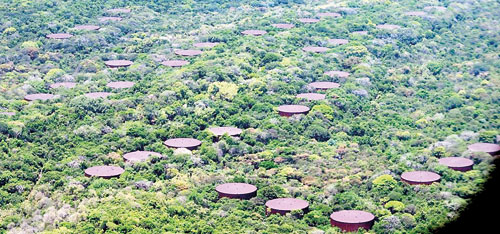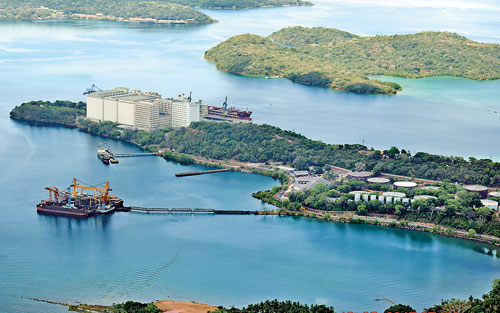News
Trinco oil farm: PM to expedite deal with India
View(s):But CPC trade unions insist that Sri Lanka is selling ‘our fount of wealth’
By Namini Wijedasa
Prime Minister Ranil Wickremesinghe has mandated the setting up of a committee to negotiate with India the development of the Trincomalee upper oil tank farm.
“The matter was taken up at the Cabinet Committee on Economic Management (CCEM) meeting on Wednesday,” an authoritative official source said. “The Prime Minister said to please appoint a committee to carry it forward as the Indians are complaining that we are dragging it.”
Mr. Wickremesinghe returned to Colombo early on Wednesday after a visit to China. In April, India and Sri Lanka signed a Memorandum of Understanding with a commitment, among other things, to develop the upper tank farm in Trincomalee in a joint venture between the Indian Oil Corporation (IOC) and the Ceylon Petroleum Corporation (CPC).

An aerial view of the Trinco oil farm (above) and (below) the nearby Trinco harbour. Pix by Namini Wijedasa
“Frankly speaking, the Sri Lanka Freedom Party thinking — including that of President Maithripala Sirisena and Petroleum Minister Chandima Weerakkody — is not to give the tank farm out,” the source said. “But Prime Minister Wickremesinghe wants to keep India on our side. India is not going to take the farm and run away.”
“Trincomalee is a strategic location and Indian presence there will create confidence,” he continued. “We will set up a meeting to carry it forward. We will start the process.” No date has yet been set; neither was a committee named.
India is “keen to conclude an agreement as soon as possible”. But the Indian leadership also acknowledges the importance of allowing Sri Lanka to proceed at a pace it is comfortable with, given the political sensitivities. Among the areas to be explored is the CPC’s shareholding in the joint venture company and the investment each party will make. Once the relevant agreement is signed, a consultant will be appointed to determine how much would be needed to renovate the tanks. They are now engulfed in thick jungle, with only the tops visible.
Prime Minister Wickremesinghe’s instructions this week were given out amid renewed opposition to the deal by CPC trade unions. “This is our fount of wealth,” a leaflet now in circulation says, referring to the tank farm first built on 850 acres by British colonialists in 1930.
“It is not the people of the country, the true owners of this resource, who must suffer punishment for a lack of foresight in not putting it to use,” it asserts. “By transferring it to foreigners, are we not handing over our fount of wealth and our authority to India?”
The unions struck work in April — on the eve of Mr. Wickremesinghe’s visit to New Delhi — demanding that the Government abandons any plans to “sell” or lease out the tanks to India. They resumed duties only after the Prime Minister pledged to consider their proposals before taking a decision on the tank farm.
The upper tank farm comprises 84 tanks. Of a total of 101, only 99 are usable. The lower farm has been managed jointly by the CPC and the IOC — via Lanka IOC Pvt Ltd or LIOC — since 2003. The LIOC has refurbished these tanks, pipelines and jetty as well as created new facilities such as additional storage tank and lubricant blending facilities. An annual rent of US$100,000 a year is being paid for the facility.
But a 2003 tripartite agreement signed between the Sri Lankan Government, the LIOC and the CPC covers the entire tank farm — upper and lower. It is on this basis that India now wants to move forward. Previous efforts have failed.
In 2012, under the Mahinda Rajapaksa administration, the LIOC applied to Sri Lanka’s Board of Investment to set up a US$ 5.2 million bitumen handling facility in the upper tank farm. It also hired a project consultant. But approval was not granted. Subsequently, the LIOC submitted other proposals to develop the upper tank farm. Again, permission was denied.
 With the victory of the Sirisena administration in 2015, however, India revived its push on the upper tank farm. It expressed willingness to set up a joint venture which would prepare a business development proposal. And it agreed to first renovate 10 tanks in the upper farm for Sri Lanka’s exclusive use. India believes it could turn the project into an international oil storage facility that would provide viable alternative to Singapore and to Fujairah in the United Arab Emirates.
With the victory of the Sirisena administration in 2015, however, India revived its push on the upper tank farm. It expressed willingness to set up a joint venture which would prepare a business development proposal. And it agreed to first renovate 10 tanks in the upper farm for Sri Lanka’s exclusive use. India believes it could turn the project into an international oil storage facility that would provide viable alternative to Singapore and to Fujairah in the United Arab Emirates.
But the unions are wary. Their leaflet blames successive Sri Lankan regimes for failing to put the Trincomalee tank farm to use. It points out that the Government first proposed to lease out 10 tanks to Singapore in 2002. This plan was abandoned in favour of India in 2003, when a tripartite agreement was signed.
The unions state that India first took over the tanks on a rental. But one condition of the deal was that a formal lease agreement would be signed within six months. “This was never done,” their leaflet says. Therefore, the LIOC has been using the tanks illegally since then on the payment of an annual amount to the Sri Lankan Government.
If the CPC distributes fuel to the North and East and the North Central Provinces from Trincomalee, it could save Rs. 900 million a year in transport, shipping and late fees, the unions claim. This is much more than the rent paid by the LIOC to the Government. The CPC’s storage tanks in Kolonnawa and Muturajawela can only store two week’s worth of oil. “If we have 99 tanks of our own, why must we waste more public funds to put up new tanks?” they ask.

